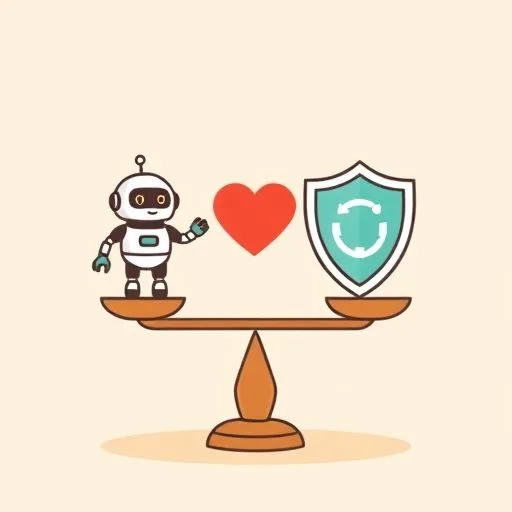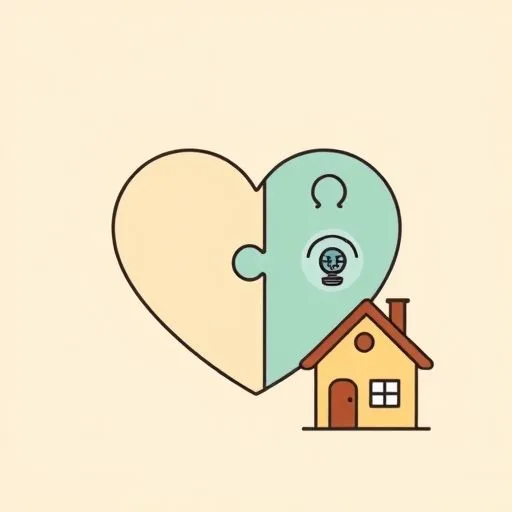
Honey, the kids are finally asleep, and the house is quiet now. After a busy day, taking a breath in this calm, I found myself wanting to talk to you about something. I saw an article today about AI mental wellness tools, and it just made me think. We hear more and more about people, especially young people, turning to chatbots for comfort when they’re feeling low. It’s easy, it’s always there, and that’s certainly appealing. But then, a little worry creeps in, doesn’t it? Is it truly safe? What does this mean for our family, and for all of us carrying heavy loads every day? I wanted us to think together about how we can smartly navigate this new landscape, especially when it comes to balancing AI for kids’ mental wellness. Reading that article, my first thought was of us parents and all the quiet strength we show.
AI Mental Health Support: A Double-Edged Sword

The article mentioned that more than half of young people feel comfortable talking to AI about their mental health concerns. While that accessibility is amazing, it’s also what makes me pause. I wonder if our children might one day find themselves in a similar situation. But then, it also highlighted a growing number of reports where AI chatbot use actually caused harm. Many general chatbots aren’t built with safety measures, meaning users can sometimes become emotionally over-reliant, or even find their existing anxieties amplified. You know how sometimes we rely on GPS but it takes us the wrong way? That’s how I worry about these AI tools—they might offer directions but miss the real destination. I can imagine that for parents like us, juggling so much through the day, feeling that deep fatigue, an AI might offer a momentary sense of relief. But for that comfort to be a true help, not just a fleeting escape, the article stressed that these tools need to be carefully designed by experts, with clear, specific purposes. It really drove home the idea that for our true peace of mind, warm human connection is still the most vital thing. This is why having AI mental health safety tips is so important for us as parents.
Building Healthy AI Support for Families

So, how can these AI tools truly become a help rather than a hindrance? The article made it clear: defined usage boundaries and clinical oversight are absolutely essential. Think of it like a cliff edge with a ‘do not cross’ sign; AI mental wellness tools also need clear safety lines. Transparent disclaimers, telling users the tool’s purpose and limitations, are crucial too. It’s like how we teach our children, ‘this is okay, but that’s dangerous.’ And most importantly, there needs to be a quick way to connect with real people when complex issues arise that AI can’t handle. You know, when we carry heavy loads and share them, just listening can be a huge comfort.
No matter how much technology evolves, our warmest safety net remains our care for each other and the expertise of human professionals.
This is the heart of building healthy AI support for families.
Using AI Wellness Tools for Children Wisely

So, how can we thoughtfully integrate these AI tools into our lives, especially when considering our children? The article emphasized that AI should be seen as a ‘complement,’ not a ‘substitute,’ for professional mental health care. You wouldn’t rely solely on a DIY guide for heart surgery, would you? Similarly, complex emotional issues can’t be entrusted to AI alone. We need to prioritize choosing reliable tools that are clinically validated and come with robust safety features. And perhaps most importantly, we need the courage to recognize our own limits and, when facing complex problems, not hesitate to seek help from human experts. It’s like when we carry too much ourselves; we remind each other, ‘You don’t have to do it all alone—we’re here with you.’ We shouldn’t forget that when it comes to protecting our emotional well-being, seeking support from those around us is vital. When we find the courage to say ‘I’m finding things a bit tough lately’ instead of struggling in silence, it means the world to us all. We’ve got this! Together, we can navigate this new world while keeping our family’s heart connections strong and vibrant!
Source: Why are millions turning to general purpose AI for mental health? As Headspace’s chief clinical officer, I see the answer every day, Fortune, 2025/09/16 12:30:00
